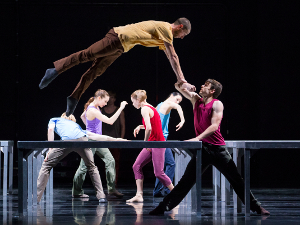Higher Education in America tends to rely heavily upon adjunct faculty for music teaching support. This practice helps keep the department’s annual budget down, usually results in qualified applied instrument instruction, and can make for a community draw on the public recital front.
At this program Wayne Kirby, UNCA Chair of the Music Department, went out of his way during introductions to make sure the sizeable audience knew how valued Judi Lampert, Adjunct Instructor in flute, is to the program, “I am pleased to introduce one of our stars.” I know from past experience he also digs very hard to compensate his players and guests. On this night he must have had to dig very deep because in addition to Lampert the guests were all big shots; fellow UNCA Adjunct Instructor Elsa O’Farrell accompanying on piano, fellow flutist Eldred Spell guesting from Western Carolina University, and Steven Walter, Professor of Guitar at Furman University. All of these people are pros. And there it is! A professional concert featuring American music by Aaron Copland, Robert Beaser, Katherine Hoover, Henry Mancini, Peter Schickele and Gary Schocker.
Copland’s atmospheric Duo for Flute and Piano opened the program. In three movements, it gave the first hint of Lampert’s long tones, intonation, articulation and general precision in ensemble. All outstanding and like a rock. O’Farrell, a musician I first heard in the middle ’70s and took note of her splendid artistry, provided equally precise and crisp articulation in addition to consummate role playing in the ensemble. The whole was dispatched and we moved on.
Next came four of Beaser’s Mountain Songs for Flute and Guitar: “Barbara Allen,” “The House Carpenter,” “He’s Gone Away” and “Quicksilver.” This is relevant music for this part of the State, filled with toothy themes a flute makes very lyrical and familiar. Walter took the brutally difficult accompaniment into his personal well of skills and produced a highly polished and efficient foundation notable for outstanding tone, excellent balance, and daring velocity when required.
Then came two flute solos: Hoover’s “Kokopeli” for Solo Flute, and the Thorn Birds theme by Mancini. I struggled with the placement and thematic material of these pieces. I don’t care for Hoover’s music that much, and the Mancini didn’t seem to stick in memory or satisfy the next leg of the program’s musical journey. Both were played well, but it almost seemed like an intermission.
Following the solos came the twenty-minute, five-movement Spring Serenade for Flute and Piano by Schickele. This music opened with the flute off stage behind a fly then continued with Lampert joining on-stage. The work has a strikingly successful element of downward cascading scales shared in parallel with the piano. Of course there is the occasional wit and surprise in both rhythm and harmony that we’ve come to expect from the Professor, including one section of periodic blues with a pentatonic feel. I always come away from Schickele’s music feeling he is an intellectual version of Spike Jones without the guns.
The program ended with Three Dances for Two Flutes and Piano by the hyper-productive American flutist Gary Shocker. Eldred Spell joined Lampert, and the level of precision from the stage cubed. The two flute players matched tone and articulation in these interesting and provocative pieces. O’Farell at the piano was again ahead of the curve and answered every nuance with her own brand of precise execution.
During a post-concert reception in the Lipinsky foyer, Wayne Kirby was beaming amid a seeming embarrassment of riches. “Can you believe this? Pretty good gig, eh?” This from a guy who knows in real time what is happening. So, too, Judi Lampert and her support cast of professionals. A good gig indeed!











